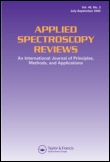
APPLIED SPECTROSCOPY REVIEWS
Scope & Guideline
Illuminating Advances in Applied Spectroscopy
Introduction
Aims and Scopes
- Spectroscopic Techniques Development:
The journal focuses on the advancement and optimization of various spectroscopic techniques such as Raman spectroscopy, FTIR, laser-induced breakdown spectroscopy (LIBS), and others, highlighting innovations in instrumentation and methodology. - Applications in Biomedical and Pharmaceutical Fields:
A significant portion of the published work explores the application of spectroscopy in biomedical research, including disease diagnosis, drug analysis, and the characterization of biological materials. - Environmental and Industrial Applications:
The journal covers the utilization of spectroscopic methods in environmental monitoring, pollution assessment, and industrial process control, emphasizing their role in sustainability and safety. - Integration with Chemometrics and Machine Learning:
There is a consistent focus on the integration of spectroscopic techniques with chemometric methods and machine learning for enhanced data analysis and interpretation. - Emerging Contaminants and Novel Materials:
Research that delves into the detection and analysis of emerging contaminants, as well as the development of new materials for spectroscopic applications, is a recurring theme.
Trending and Emerging
- Multimodal Spectroscopy Approaches:
There is a growing trend towards the integration of multiple spectroscopic techniques to enhance analytical capabilities, particularly in complex samples in biomedical and environmental contexts. - Real-Time and In-Situ Monitoring:
Research focusing on real-time and in-situ monitoring applications of spectroscopy is on the rise, especially in environmental sensing and industrial processes, reflecting a need for immediate data acquisition. - Nanomaterials and Surface-Enhanced Techniques:
The application of nanomaterials, particularly in surface-enhanced Raman spectroscopy (SERS), is increasingly prominent, showcasing advancements in sensitivity and detection limits for various analytes. - Focus on Health and Disease Diagnostics:
There is an expanding emphasis on the use of spectroscopy for health-related applications, including disease diagnostics and monitoring, underscoring the relevance of these techniques in clinical settings. - Sustainability and Green Chemistry Applications:
Research that emphasizes sustainability and environmentally friendly methods within spectroscopy, including green chemistry approaches, is gaining momentum, reflecting broader societal concerns.
Declining or Waning
- Traditional Spectroscopy Applications in Non-Environmental Contexts:
There appears to be a waning interest in traditional applications of spectroscopy that do not align with current environmental concerns or industrial advancements, as newer, more relevant applications gain traction. - Basic Theoretical Studies:
The journal has seen a reduction in purely theoretical studies or reviews that do not connect directly with practical applications, indicating a shift towards more applied research. - Single-Modality Spectroscopy:
Research focusing solely on single-modality spectroscopic techniques, without integration into multimodal approaches, seems to be declining as the field moves towards more comprehensive, multi-faceted methodologies.
Similar Journals
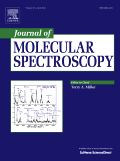
JOURNAL OF MOLECULAR SPECTROSCOPY
Decoding Molecular Behavior with Precision and ExcellenceJOURNAL OF MOLECULAR SPECTROSCOPY, published by Academic Press Inc Elsevier Science, serves as a pivotal platform in the fields of Atomic and Molecular Physics, Physical and Theoretical Chemistry, and Spectroscopy. With its inaugural issue dating back to 1957, this journal has maintained a rich history of disseminating significant research findings, contributing to an understanding of molecular behavior and interactions through various spectroscopic techniques. Although currently positioned in the Q3 quartile across its respective categories as per 2023 rankings, the journal aims to enhance its stature further by promoting rigorous and impactful studies that push the boundaries of knowledge in spectroscopy. While access to this publication is not open, the rigorous peer-review process ensures that the articles published maintain high standards of scientific excellence, appealing to researchers, professionals, and students seeking comprehensive insights into molecular spectroscopy. The journal's ISSN is 0022-2852 and its E-ISSN is 1096-083X.

SPECTROSCOPY AND SPECTRAL ANALYSIS
Exploring Innovative Techniques in Spectral AnalysisSPECTROSCOPY AND SPECTRAL ANALYSIS is a pivotal journal published by the OFFICE SPECTROSCOPY & SPECTRAL ANALYSIS in China, dedicated to advancing the field of spectroscopy and its associated techniques. With an ISSN of 1000-0593, this journal provides a platform for researchers, professionals, and students to disseminate innovative studies and findings related to spectroscopy, covering various applications from fundamental research to technological advancements. Although it currently stands in the Q4 quartile for both Instrumentation and Spectroscopy as per the 2023 categorization, it continues to play a crucial role in fostering dialogue and collaboration within the scientific community. The journal features contributions that explore the latest methodologies and applications, making it a valuable resource for those aiming to deepen their understanding and application of spectroscopic techniques. It operates within a competitive landscape, ranked at the 16th percentile in Chemistry (Spectroscopy) and 15th percentile in Physics and Astronomy (Instrumentation), which underscores its targeted influence in these fields. Interested readers can access the journal to stay informed about pioneering research, helping to bridge the gap between theoretical insights and practical applications.
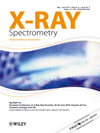
X-RAY SPECTROMETRY
Advancing the frontiers of X-ray spectroscopy.X-RAY SPECTROMETRY is a distinguished journal published by Wiley that focuses on the advancements and applications of X-ray spectroscopic techniques in various scientific fields. Established in 1972, the journal has become a prominent platform for researchers and professionals, promoting the exchange of innovative ideas and thorough investigations in spectroscopy, particularly within the realm of chemistry. With an ISSN of 0049-8246 and an E-ISSN of 1097-4539, it maintains strong visibility in academic circles. The journal currently holds a Q3 ranking in Spectroscopy, positioned at rank #52 out of 76 in the Chemistry category according to Scopus metrics, reflecting its solid standing in the field despite its percentile of 32. While X-RAY SPECTROMETRY is not an Open Access journal, it offers valuable insights and contributions from various researchers, ensuring a rich resource for those invested in the study of spectrometric applications and innovations. Researchers, students, and professionals alike will find it an essential addition to their academic library, aiding in the advancement of knowledge in spectroscopy.

JOURNAL OF NEAR INFRARED SPECTROSCOPY
Pioneering Insights in Chemical and Agricultural AnalysisJOURNAL OF NEAR INFRARED SPECTROSCOPY, published by SAGE PUBLICATIONS LTD, is a leading platform dedicated to advancing the field of near-infrared spectroscopy, a pivotal technique for various applications in chemical, food, and agricultural analyses. With its ISSN 0967-0335 and E-ISSN 1751-6552, this highly respected journal publishes innovative research and review articles that contribute to the understanding and application of spectroscopic methods. The journal has maintained a respectable Q3 ranking in the Spectroscopy category and has a Scopus rank of #51/76 in Chemistry _ Spectroscopy, placing it within the 33rd percentile. This positions the journal as an essential resource for researchers, professionals, and students looking to stay informed on the latest advancements and methodologies in near-infrared spectroscopy. Although the journal currently does not offer open access options, it is pivotal for fostering knowledge exchange and collaborative research within its community. With convergence spanning from 1996 to 2024, it continues to be a reliable source of impactful academic content.

Journal of Biophotonics
Bridging Theory and Application in BiophotonicsJournal of Biophotonics is a prestigious academic journal published by WILEY-V C H VERLAG GMBH in Germany, dedicated to advancing the field of biophotonics through high-quality research. With an ISSN of 1864-063X and an E-ISSN of 1864-0648, this journal is recognized for its contributions within diverse categories, including biochemistry, genetics, molecular biology, chemistry, engineering, materials science, and physics, earning a commendable Q2 ranking in several of these fields as of 2023. The journal aims to bridge the gap between theoretical research and practical applications, fostering interdisciplinary collaboration that is critical for innovations in imaging, diagnostics, and therapeutics. Researchers, professionals, and students alike will find the Journal of Biophotonics invaluable for staying informed about the latest developments and breakthroughs in this dynamic field, making it a cornerstone for knowledge dissemination and scholarly discourse from its inception in 2008 and continuing through 2024.
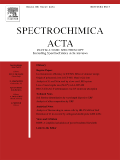
SPECTROCHIMICA ACTA PART B-ATOMIC SPECTROSCOPY
Catalyzing Breakthroughs in Spectroscopic Methodologies.SPECTROCHIMICA ACTA PART B-ATOMIC SPECTROSCOPY, published by PERGAMON-ELSEVIER SCIENCE LTD, is a leading peer-reviewed journal dedicated to advancing the field of atomic spectroscopy. With a respectable impact within its category—achieving Q2 quartile rankings in Analytical Chemistry, Atomic and Molecular Physics, Instrumentation, and Spectroscopy according to the 2023 metrics—this journal plays a pivotal role in disseminating high-quality research findings. Over its impressive publication history since 1967, the journal has continuously provided a platform for researchers to present innovative methodologies, theoretical advancements, and practical applications related to atomic spectroscopy. The journal is recognized for its rigorous peer-review process and aims to foster scholarly dialogue among professionals and students alike, reinforcing its significance in the scientific community. Although it does not offer open access options, its strong presence in notable databases ensures that the research reaches a broad audience. As a part of the ongoing dialogue in atomic and molecular sciences, SPECTROCHIMICA ACTA PART B is an essential resource for those at the forefront of related research.
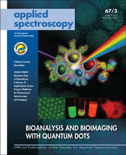
APPLIED SPECTROSCOPY
Transforming Knowledge into Practical ApplicationsApplied Spectroscopy, published by SAGE Publications Inc, is a leading journal in the field of spectroscopy and instrumentation, with a legacy dating back to 1970. This esteemed journal, recognized within the Q2 category for both Instrumentation and Spectroscopy in 2023, provides critical insights and advancements that cater to a wide audience of researchers, professionals, and students. With its Scopus rankings placing it in the top 20% of publications in its respective fields, Applied Spectroscopy stands out for its rigorous peer-reviewed content that drives innovation in analytical techniques and applications. Though not an open-access publication, readers can access a wealth of research articles, reviews, and experimental findings that enrich the scientific discourse in spectroscopy. With a focus on enhancing the understanding and practical applications of spectroscopy, this journal is an essential resource for anyone engaged in this dynamic and evolving discipline.
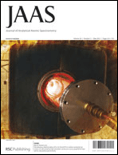
JOURNAL OF ANALYTICAL ATOMIC SPECTROMETRY
Pioneering Insights in Analytical Chemistry.JOURNAL OF ANALYTICAL ATOMIC SPECTROMETRY, published by the esteemed Royal Society of Chemistry, stands as a vital resource in the fields of Analytical Chemistry and Spectroscopy. Since its inception in 1971, this journal has been committed to disseminating cutting-edge research, offering an invaluable platform for the presentation of quantitative and qualitative analytical methods. With an impressive impact factor and a current classification in the Q2 category of both Analytical Chemistry and Spectroscopy, it significantly contributes to the advancement of knowledge in these disciplines. Researchers, professionals, and students looking to deepen their understanding of atomic spectrometry will find a wealth of innovative studies, reviews, and methodological papers that consistently push the boundaries of traditional and emerging analytical techniques. Although not an open-access journal, it provides accessible options that facilitate the engagement of a broad academic audience, ensuring that vital research is not confined solely to institutional repositories. The journal's exceptional standing, demonstrated by its strong Scopus rankings, further underscores its critical role in the scholarly communication landscape.

Biomedical Spectroscopy and Imaging
Innovating the Future of Biomedical Imaging TechnologiesBiomedical Spectroscopy and Imaging, published by IOS Press, is a pivotal journal in the field of biomedical engineering and imaging technologies, specifically focusing on spectroscopic methods and their biomedical applications. With an emphasis on advancing knowledge and innovation in spectroscopy and imaging, the journal serves as a vital platform for disseminating high-quality research that bridges the gap between theoretical studies and practical applications in healthcare. Despite its coverage being discontinued in Scopus after 2015, the journal continues to contribute significantly to the scientific community, fostering interdisciplinary collaboration among researchers and professionals. The journal does not have an Open Access option, which provides a unique challenge for authors and readers alike, promoting engagement with subscription-based scholarly communication. As aspiring researchers and seasoned professionals delve into its pages, they will discover a rich array of studies and insights that not only enhance their understanding but also inspire future investigations in this dynamic field.
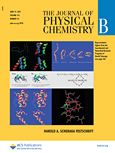
JOURNAL OF PHYSICAL CHEMISTRY B
Exploring Interdisciplinary Applications of ChemistryJournal of Physical Chemistry B, published by the American Chemical Society, is a leading international platform dedicated to advancing our understanding of physical chemistry and its applications in various interdisciplinary fields. With an impressive 2023 Impact Factor, and categorized in Q1 for Physical and Theoretical Chemistry as well as Surfaces, Coatings and Films, this journal showcases cutting-edge research that contributes significantly to materials science, supporting the innovative development of new materials and technologies. The journal, established in 1997 and converging its years of publication to 2024, maintains rigorous peer-review standards and is accessible to a global audience, enabling the dissemination of pivotal research findings. Moreover, it is renowned for its comprehensive coverage in the realms of materials chemistry and miscellaneous medical applications, making it a vital resource for researchers, professionals, and students alike in their pursuit of excellence in scientific inquiry.